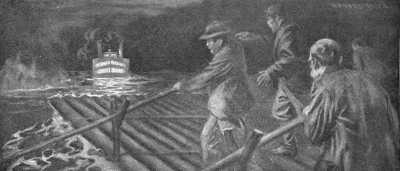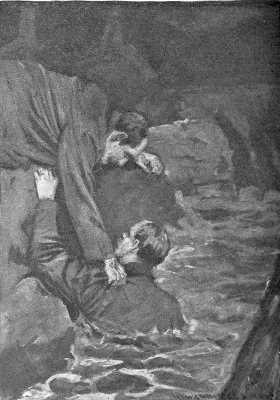
“How she flies!” said Steve Boone, the pilot, to the rower in the centre of the raft. “We must be beating the current by at least two miles an hour!”
Perkins, the rower, glanced down at the yellow torrent of the Cumberland, the swiftest and deepest river in the world in proportion to its length, and then up at the lofty banks that sped by, misty in the twilight. But he said nothing, merely nodding his assent. There were five men on the raft, and they never changed their positions.
The river began to curve again and to shoot around dangerous angles, and the pilot’s orders now came sharp and fast. The night settled thick and black. Boone looked anxiously at the river.
“How far ahead do you cal’late it is to Corn Island?” he said to Perkins.
“’Bout six miles, I reckon,” replied the rower, never taking his eyes from the stream. “You take the chute to the right?”
“O’ course; it’s the only safe passage.”
The cliffs rose higher above their heads, and the stream, narrowing, grew swifter than ever. There was a dull moaning of the wind through the forest, mingled with the angry lashing of the current on the rocks.
They whirled around a cape, dashed down the middle of the stream, and then saw ahead of them a dark object.
“Corn Island!” said Boone.
The rowers nodded.
“Pull her to the right!” called Boone, sharply, and the rowers swung the great raft toward the narrow passage around the island. Here the river was flowing swift and deep between the high bank of the mainland and the low rocky shore of the island.
The island was two miles long, and already Boone wished that he was clear of it; the channel was too narrow. Suddenly Perkins, the oarsman, a man with the ear of a hound, raised his head, and Boone saw by the light of the shanty fire that his face had turned pale.
“Did you hear that?” he asked, eagerly.
“Hear what? I don’t hear anything!”

“I do! It’s music, an’ it’s in the island chute as sure as shootin’!”
The raft rushed on, sending away little waves of yellow foam, and the wind still moaned on the high bank above them. To Boone’s own ears came the unmistakable sound of music, and then out of the darkness in front of them shot a great light. Behind this light loomed the shape of a river steamer, like a great white ghost, its decks crowded with people.
“It’s the Nancy Belle, an’ we’re meetin’ in the island chute!”
The rowers said nothing, but their faces were white as they looked up at their leader and awaited his orders. A few minutes more and the great raft with its tons and tons of weight would crash directly into the Nancy Belle, which still came swiftly on. The two could not pass in that narrow channel. Boone hesitated only a moment, but in that moment all the long year’s work and the glory of his great raft passed before him. Then he shouted:
“Pull to the left! Pull to the left! Pull to the left!”
The five rowers, though they knew well what the command meant, pulled as if they were one machine, to the left, and the raft swung sharply at an angle toward the low shore of Corn Island. Then the powerful voice of Boone was raised again:
“Jump! Jump for your lives!”
When the raft struck with a crash upon the rocks the six men sprang for the shore. Boone fell in deep water, and when he came up again his ears were filled with a tearing, crashing sound, as the current and the rocks broke the “strapping” of the raft and sent the detached logs whirling down the river.

A log struck his left arm, and with a thrill of pain it fell useless by his side. But a strong hand seized him by the collar and dragged him to the shore.
“Are you hurt?” asked Perkins.
“Only a broken arm. Are we all here?”
“Yes, all here, bruised, but safe.”
Up the river showed the stern light of the Nancy Belle, steaming safely past, and from her decks still came the soft sound of music, dying away presently in the darkness.